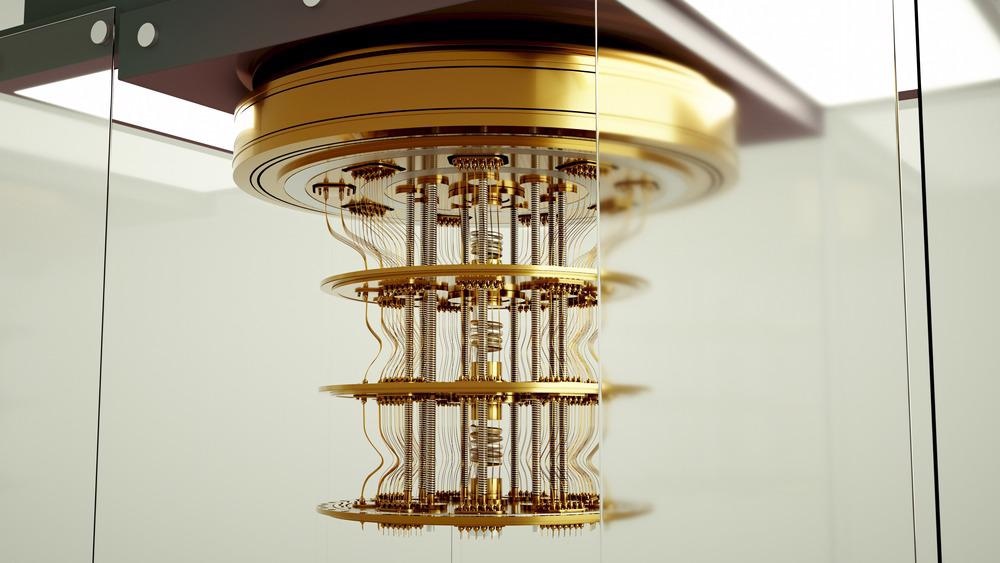Quantum physics may describe the Universe at the smallest scales, but the machines that rely on it are still pretty big.

Image Credit: Bartlomiej K. Wroblewski/Shutterstock.com
Quantum physics is the best description we have of the Universe at the smallest scales, but quantum computers are still pretty big. By how much can we shrink these computing systems of the future?
There are currently several roadblocks standing in the way of quantum computers becoming the computing technology of the future. Firstly, despite possessing incredible computing power, these machines make a lot of mistakes.
Secondly, because quantum systems are incredibly sensitive to environmental factors, the phenomena that power quantum computers are easily disturbed which can lead to memory loss and data destruction.
A less commonly addressed problem is the fact that quantum computers, as they currently exist are pretty huge, especially compared to classic computing systems.
Perhaps the most famous currently operating quantum computer is Sycamore, which has 53 qubits — the foundational element of quantum computers just as bits are for classic computers.
Because of the possible environmental effects on quantum computers, the approach by Google and their challengers in the race for “quantum supremacy” — the development of a practical and reliable quantum computing device — is to keep the systems cool using cryogenics.
Freezing qubits and keeping them at near absolute zero is no small feat. It means surrounding these devices with a large, complex, and expensive infrastructure.
Oxford professor Ian Walmsley thinks that his company, Orca Computing, may have come up with a solution to the quantum computer size problem. Orca says that they have developed the world’s smallest quantum computer, and it doesn’t need constant cooling.
The Race For Quantum Supremacy Heats Up
Orca’s quantum computer is based on Warmsley’s experience in the field of photonics — the science behind the generation, detection, and manipulation of light that burgeoned following the invention of the laser.
The really remarkable thing about the system is that it is stored within a standard server cabinet. This makes Orca’s system appear like any ordinary computer.
The key to this development is the fact that the photons upon which the system is based don’t interact with the surrounding environment meaning that they don’t have to be super-cooled.
“Photonic qubits are awesome, but current photonic machines require many, many redundant components to deal with the fact that the robustness of photons against ‘noise’ also means that it’s hard to get photons to interact in a quantum system as and when needed,” the company explains on its website.
“ORCA solves this quantum photonics component redundancy problem using the ORCA quantum memory, opening up the promise of quantum photonics without the significant trade-offs of existing approaches.”

Image Credit: Bartlomiej K. Wroblewski/Shutterstock.com
Currently, Orca’s system is operating with just four qubits, meaning that with the processing power of a thermostat or a smartwatch, it is way behind its quantum competitors.
That means the Orca team faces a major scaling-up challenge. A separate team of researchers based in Austria, Switzerland, and Germany, have also developed a diminutive quantum computer.
The system, which is described in a paper published in the journal PRX Quantum, contains 24 fully-entangled qubits. The trapped entangled calcium ions that comprise its qubits stayed in a quantum entangled state without the need to be stored at intensely cold temperatures.
As with Orca, this cuts down on space demands. The system is sealed within aluminum boxes that fit on two 19-inch industry-standard server racks.
“Quantum information processing is steadily progressing from a purely academic discipline towards applications throughout science and industry,” the authors of the paper write.
“Transitioning from lab-based, proof-of-concept experiments to robust, integrated realizations of quantum information processing hardware is an important step in this process.”
They add that the nature of traditional laboratory setups does not offer itself readily to scaling up system sizes or allow for applications outside of laboratory-grade environments. “This transition requires overcoming challenges in engineering and integration without sacrificing the state-of-the-art performance of laboratory implementations,” the authors explain.
This team says that their modular quantum machine has high mechanical stability, easily replaceable parts, and minimal requirements for system maintenance, and believes it could be operated by trained non-specialists.
They also say that the system could be used by remote operators worldwide with cloud-based quantum computing. But like Orca, this system has a long way to go.
Early Days For Quantum Computing
Quantum computers could be employed in a range of fields, including in the accurate modeling of quantum systems themselves, something that classical computers cannot do well. Other applications include the modeling of climate systems and other complex systems comprised of multiple elements.
The thing is, doing this will require systems comprised of hundreds of entangled qubits, way more than demonstrated in either system and more than is planned for future tests of these devices.
Of course, when considering the size of quantum computers, it is handy to remember that it’s early days for this technology. Also, when the classic computers first rose to prominence they also filled a room, and the idea that you could carry one around with you on a day to date basis would have seemed laughable.
Of course, this is only a loose analogy, as classical computers and quantum computers are based on radically different infrastructures and the issues involved with miniaturization in these distinct technologies are radically different.
The days when you can fit a quantum computer into your laptop bag may be a long way away, they may never arrive, but researchers are working hard to make these machines more viable and space-saving.
Sources
Orca Computing [https://www.orcacomputing.com/]
Pogorelov. I., Felder. T., Marciniak. Ch. D., et al, [2021], ‘Compact Ion-Trap Quantum Computing Demonstrator,’ PRX Quantum, [https://journals.aps.org/prxquantum/abstract/10.1103/PRXQuantum.2.020343]
Disclaimer: The views expressed here are those of the author expressed in their private capacity and do not necessarily represent the views of AZoM.com Limited T/A AZoNetwork the owner and operator of this website. This disclaimer forms part of the Terms and conditions of use of this website.